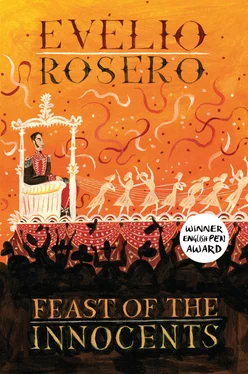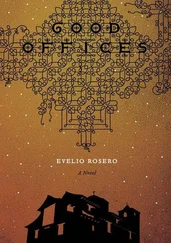He went up the stairs, a thoughtful, irresolute ape, one hand on his chin, the other scratching the shaggy head, more surprised at himself now than when he saw himself in the mirror, he went up as if he were on the point of collapse, to the first floor where the guest bedroom was, along with the laundry room, the toy room and, furthest away, his library, which was also the chess nook, with its rosewood table, marble pieces and two solitary chairs.
He went in there and stopped by the chessboard, where he had last played years before with his neighbour Arcángel de los Ríos, Don Furibundo Pita, winning a bet he could no longer recall. He remembered, yes, they started another game straight away, but did not finish it because they were interrupted by a tremor, the brief but worrying tremor that traversed the city, a terrestrial shudder that made lamps swing and the foundations of the houses creak; tremors were frequent in Pasto, a city wisely wary of its fiery volcano — the age-old Galeras, which poked its nose from under your sheets at the most unexpected moments — they were disturbed by this tremor, which on other occasions lasted a long time, too long, and left its mark by demolishing poorly constructed houses, but God knows how He distributes his earthquakes, he thought, how He metes them out, assigns their victims, how He ends the ones that must end and how He leaves alone the ones yet to begin, but, he wondered, is God really fair? God, God, the tremor — like the heart of the volcano — it would gnaw away at you in the most intimate hours of the soul, it was an unsuspected, unexpected, ill-timed and always-unwanted guest who was dreaded as the city’s worst joke, or worst fright— from Pasto, with love to my children: a volcano is my heart —the city’s immemorial joke, fright and joke simultaneously, it froze hearts while it lasted, thoughts were fractured for the duration of the rocking, hairs rose on the nape of your neck, you went grey, on one occasion, the last, he had had to curtail the climactic embrace with Primavera, the almost-sweet finish in unison, through the singular fault of a a tremor, the fear of dying was that strong, stronger than the culminating embrace, it tore them apart at the peak of the restorative embrace and did not fit itself to the desperate rhythm of their bodies — as the most innocent would think it might — but dangled them from the all-encompassing fear of death, which is stronger than any love.
It had been his last attempt to love and fall in love again.
Finally the ape resolved to tackle the third storey of the house, the octa-gonal floor with wood-panelled walls, large paintings of Christs and Madonnas hanging here and there, intimate and familiar, where his daughters’ rooms and his own marital bedroom were to be found, all three doors open wide.
He had promised himself he would burn the disguise right away, embark on another session of sleep-love in bed with Primavera Pinzón, but he paused, lost in thought, before the bedroom of the elder of his daughters, Luz de Luna — the name insisted upon by his wife, who had still considered herself a poet on entering into marriage and decreed that if she gave birth to a girl she would be called after the poem she wrote on her wedding night, “Luz de Luna: This day the pure moonlight arrives at my wedding bed / And frees my soul from the dark circus where it wanders / It illuminates and redeems it from the onslaught of the donkey who / With his brutish conquering lance / Pierces my maidenhood. ” Doctor Proceso knew it by heart; it was his wife’s last poem because, according to her, she lost not only her virginity on her wedding night, but also her poetic talent, a misfortune not only for her family but for humanity — you were to blame Doctor Donkey, said his wife, who never called him by his name, but only “Doctor Donkey,” with feigned affection, unlike the women who visited the doctor’s consulting room, his utterly faithful patients of all ages who, as a courtesy, and in feminine retaliation, called him “Doctor Gentle.”
Before the charming but everyday scene of Luz de Luna sleeping, the inert ape, slack-mouthed, ran a hand over his jaw, it really was an ape in the doorway, reflecting; he went back over the fifteen years that had gone by since that highly unusual wedding night, the night that had surely engendered Luz de Luna, because many nights would pass before he tangled with Primavera Pinzón in bed again. When they got married, the doctor was thirty-five and his wife twenty: now she was a woman of thirty-five and he was a fifty-year-old. He remembered that first night as if it were this one: as soon as he finished, his wife got free of him with a cry that could have been disgust or defiance and leapt from the bed to the table to write that poem by the light of the moon — and, in fact, moonlight was shining through the window — that poem, he thought, where he ended up, in such a roundabout way, likened to a donkey.
So, his Luz de Luna was fifteen.
The bedroom window was open; it looked onto the garden, where the glossy boughs of the Capulin cherry tree reached upwards; the ape went to the window and closed it. Then, leaning over his daughter, who slept face down — long dark hair, pale profile — he saw her for what she was: already a young woman, her mouth tinged a blueish hue, open, as if she were speaking voicelessly. Stretched over the side of the bed, one of her feet stuck out from under the covers, dangling like something pink and formless, not exactly a foot, he thought, but a piece of something separate from his daughter. He thought the sight of the horrible ape would be a nasty awakening for Luz de Luna, and moved away on tiptoe: it was better to go back to his room, take off the costume and consign the joke to oblivion, the joke he had thought over to the point of exhaustion during nights of insomnia and which exalted him more every day. No. He was no good for jokes — or jokes were no good for him? What sort of man was he? Really, a normal man or a defenceless spirit exposed to the universal waywardness that makes the weak its victims? Then, cautiously, he withdrew, alarmed because his daughter spoke a word in her sleep, a word he could not understand: “stables?”
He was already heading for his bedroom when he discovered, by the half-light of a lamp, that a boy was asleep in the room belonging to his younger daughter, Floridita, in the same bed, what was the world coming to? Who could it be? That December 28, Floridita turned seven, and the boy, that boy — who was it? — seemed a little younger, around six — wasn’t it the son of Matilde Pinzón, Primavera’s sister? Primavera already knew he did not approve of the excessive camaraderie between the boy and his daughter, that constant coming and going together around the house. And now he had to find them sleeping in the same bed. For years now Primavera had utterly tormented him, and the torments he recalled were more serious than two children cuddled up in bed; Primavera, Primavera, he yelled to himself, who would not one day wish to become your murderer?
And at last he entered the marital bedroom. He forgot about the ape he found himself inside, and seeing an ape in the mirror made him swear and jump backwards: he had frightened himself, there he still was, dressed as an ape.
He carried on, hurriedly, so as not to see himself any longer. His bulky silhouette was afloat in the blue light of dawn. In the doorway he had already started to remove the ape head, determined to make it disappear, when he heard the sleeping woman moan, the humid moan of Primavera Pinzón that issued softly from the centre of the bed, her velvety tone, her indecipherable song and, instantly, he forgot about the costume, observing Primavera with delight. Was she dreaming she was making love? Dreaming of love? Or did she not love? And, from his own experience, hearing her murmur “here, here,” he opted for love, and leant over the bed, over his own bed in which this time his wife alone slept, or his wife slept alone with her dream of love: the alpaca mattress moulded itself around her supine position, one arm bent beneath her head, her face, eyes closed, pointed at the ceiling, lips parted, moist, reddened, legs splayed, the inherent scent of heat which could only emanate from her neck, from the blonde hair spread over the pillow, now Doctor Proceso López was not yelling Primavera, Primavera, who would not one day wish to become your murderer, but he promised himself solely to make her fall in love again for a minute, or die, God, God.
Читать дальше












